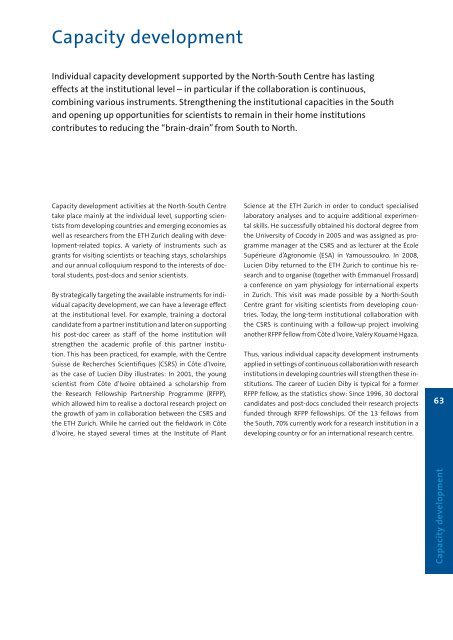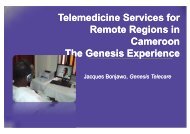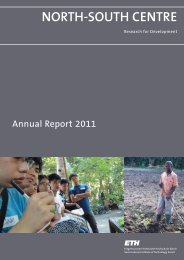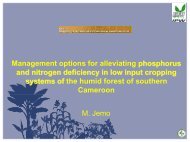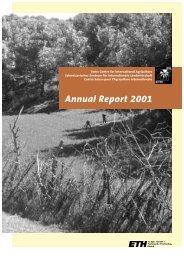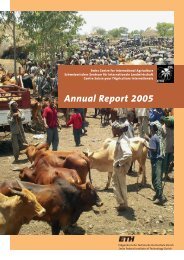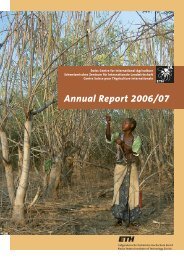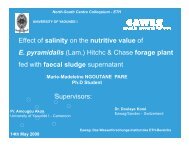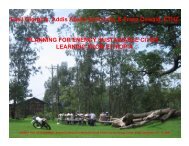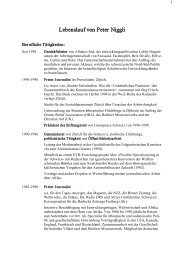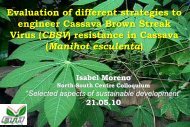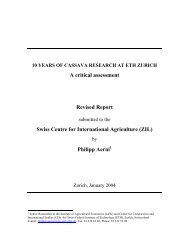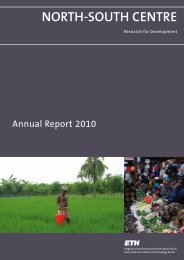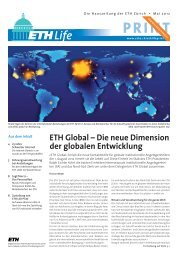NORTH-SOUTH CENTRE - ETH - North-South Centre North-South ...
NORTH-SOUTH CENTRE - ETH - North-South Centre North-South ...
NORTH-SOUTH CENTRE - ETH - North-South Centre North-South ...
Create successful ePaper yourself
Turn your PDF publications into a flip-book with our unique Google optimized e-Paper software.
Capacity development<br />
Individual capacity development supported by the <strong>North</strong>-<strong>South</strong> <strong>Centre</strong> has lasting<br />
effects at the institutional level – in particular if the collaboration is continuous,<br />
combining various instruments. Strengthening the institutional capacities in the <strong>South</strong><br />
and opening up opportunities for scientists to remain in their home institutions<br />
contributes to reducing the “brain-drain” from <strong>South</strong> to <strong>North</strong>.<br />
Capacity development activities at the <strong>North</strong>-<strong>South</strong> <strong>Centre</strong><br />
take place mainly at the individual level, supporting scientists<br />
from developing countries and emerging economies as<br />
well as researchers from the <strong>ETH</strong> Zurich dealing with development-related<br />
topics. A variety of instruments such as<br />
grants for visiting scientists or teaching stays, scholarships<br />
and our annual colloquium respond to the interests of doctoral<br />
students, post-docs and senior scientists.<br />
By strategically targeting the available instruments for individual<br />
capacity development, we can have a leverage effect<br />
at the institutional level. For example, training a doctoral<br />
candidate from a partner institution and later on supporting<br />
his post-doc career as staff of the home institution will<br />
strengthen the academic profile of this partner institution.<br />
This has been practiced, for example, with the <strong>Centre</strong><br />
Suisse de Recherches Scientifiques (CSRS) in Côte d’Ivoire,<br />
as the case of Lucien Diby illustrates: In 2001, the young<br />
scientist from Côte d’Ivoire obtained a scholarship from<br />
the Research Fellowship Partnership Programme (RFPP),<br />
which allowed him to realise a doctoral research project on<br />
the growth of yam in collaboration between the CSRS and<br />
the <strong>ETH</strong> Zurich. While he carried out the fieldwork in Côte<br />
d’Ivoire, he stayed several times at the Institute of Plant<br />
Science at the <strong>ETH</strong> Zurich in order to conduct specialised<br />
laboratory analyses and to acquire additional experimental<br />
skills. He successfully obtained his doctoral degree from<br />
the University of Cocody in 2005 and was assigned as programme<br />
manager at the CSRS and as lecturer at the École<br />
Supérieure d’Agronomie (ESA) in Yamoussoukro. In 2008,<br />
Lucien Diby returned to the <strong>ETH</strong> Zurich to continue his research<br />
and to organise (together with Emmanuel Frossard)<br />
a conference on yam physiology for international experts<br />
in Zurich. This visit was made possible by a <strong>North</strong>-<strong>South</strong><br />
<strong>Centre</strong> grant for visiting scientists from developing countries.<br />
Today, the long-term institutional collaboration with<br />
the CSRS is continuing with a follow-up project involving<br />
another RFPP fellow from Côte d’Ivoire, Valéry Kouamé Hgaza.<br />
Thus, various individual capacity development instruments<br />
applied in settings of continuous collaboration with research<br />
institutions in developing countries will strengthen these institutions.<br />
The career of Lucien Diby is typical for a former<br />
RFPP fellow, as the statistics show: Since 1996, 30 doctoral<br />
candidates and post-docs concluded their research projects<br />
funded through RFPP fellowships. Of the 13 fellows from<br />
the <strong>South</strong>, 70% currently work for a research institution in a<br />
developing country or for an international research centre.<br />
63<br />
Capacity development


